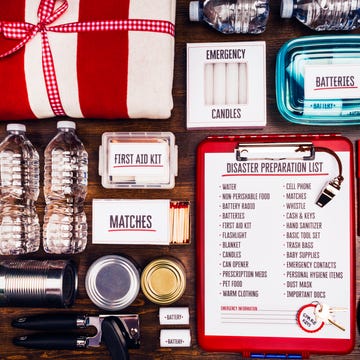Of all the new Labour ministers, Jess Phillips – Minister for Safeguarding and Violence Against Women and Girls [VAWG] – has had, arguably, a busier 10 months than most. But then, when you’re in a government that has committed to halving violence against women and girls in a decade, when you’re the minister with VAWG in your job title, there’s no option but to get busy. Even if, when she speaks to Good Housekeeping at the Home Office this week to announce more funding for victims and survivors, she jokes, ‘I need a bloody break…’
Jess isn’t the kind of minister to give herself one, though. She knows better than most – through decades of work with victims and survivors, both in and out of government – what she, and we, are facing.
One woman is currently killed every three days in the UK. So, for Jess, getting busy meant an announcement last November of new, strengthened protection orders for victims. It meant Raneem’s Law in February, embedding the first-ever domestic abuse specialists in 999 control rooms (in memory of Raneem Oudeh and her mother, Khaola Saleem, who were murdered by Raneem’s ex-husband after calling 999 four times). And this week, it meant a third domestic abuse announcement: £20m of additional funding into specialist services, including helplines, for victims and survivors.
‘I’ve seen from so many cases that I’ve handled myself, from so many domestic homicides, that one of the problems is there aren’t good enough access points,’ says Jess. ‘People get left waiting, or [they] don’t bother to call them back. And so, if I’ve got this problem, I need to come up with a long-term solution.’
The aim of this new funding is to reach as many victims as possible, in as many different communities as possible, with as many specific vulnerabilities as possible. So, more than £5m is going into support services for child victims; over £2m will support migrant victims without access to public funds; and £6m will go to nine specialist helplines, including SignHealth, which supports the deaf, and Hourglass, which helps older victims and survivors.
Violence against older women in particular is something Jess admits ‘keeps me awake at night’, with many victims traditionally not accessing any support or even able to ‘identify themselves as victims of domestic abuse’. She’s particularly concerned, due to her ‘obsession with those [cases] where it ends in the most fatal violence’, with the number of older women counted among those killed by men.
Jess’s contention that this is a ‘massive issue’ is supported by the data. In March, a report by campaign group Femicide Census revealed that one in eight women killed by men are over 70 years of age. Sixty-three per cent of family homicide victims, say Age UK, are aged 55 and over. And Hourglass reported an increase in calls to their helpline of 50% over the last two years.
Services like theirs, targeted to specific women, are vital if we want to truly make change, says Jess: ‘I’ve read enough domestic homicide reviews around, for example, older women either killed by their partners or their sons - matricide - to know that they definitely did not feel they would be able to just ring a generic domestic abuse helpline.’
Jess describes the details she finds in such case reviews as ‘breadcrumbs’ - the clues left by those who’ve been murdered, that may save another woman tomorrow. ‘In a case where they haven’t ever been in touch with any domestic abuse service, I have to say, “Okay, so what’s the domestic abuse access point that I can put in place for those women?” And that is a specialist service for that specific thing – it’s why you have to make sure you're funding older people’s services.’
The government’s full Violence Against Women and Girls strategy is due this summer and will lay out their blueprint for halving violence against women and girls. So, Jess isn’t going to get that break she needs any time soon. Of the challenge, she says, ‘There are systematic problems that are barriers to women coming forward, systematic problems with holding perpetrators accountable and there has basically not ever been a system for preventing it from happening in the first place.’
So, yes, Jess Phillips is a busy Minister. Or rather, a Minister busy trying to build a whole new system – one that will truly work for women and girls for the first time.














